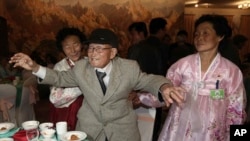North and South Korean families separated for six decades by the Korean War are spending more time getting reacquainted during a second day of emotional reunions.
The 82 South Koreans and 180 North Koreans were to spend the first part of Friday in their hotel rooms at the North's scenic Mount Kumgang resort, away from the prying eye of reporters.
On Thursday, television cameras were rolling as the elderly relatives tearfully embraced each other, exchanged gifts and shared photos of family members that neither side even knew existed.
The two Koreas remain in a technical state of war following their 1950s conflict. Neither government allows any correspondence with citizens of the other country, and very few illegal channels exist.
The families have only until Saturday to get reacquainted, when a second round of reunions will begin. Many acknowledge this will be the last time they will ever see or talk to their relatives.
It is the first time in over three years the reunions have been held. Previous events have been cancelled at the last minute because of lingering political tensions.
The current round also was nearly called off because of North Korea's frustration with joint South Korean-U.S. military drills that are set to begin on Monday.
Pyongyang views the drills as provocative and called for them to be cancelled, moved or delayed. But its eventual decision to go ahead with the reunions has many cautiously optimistic about improved inter-Korean ties.
Others say it is unlikely the reunions will bring on any drastic change, pointing out that just one month after the last reunions in 2010, the North attacked a South Korean island, killing four people.
The 82 South Koreans and 180 North Koreans were to spend the first part of Friday in their hotel rooms at the North's scenic Mount Kumgang resort, away from the prying eye of reporters.
On Thursday, television cameras were rolling as the elderly relatives tearfully embraced each other, exchanged gifts and shared photos of family members that neither side even knew existed.
South Korean Hwang Soon-sum, 87, said just being together was enough.
"I'm meeting my nephew for the first time in 70-something years, that's what it's about. It's not about getting presents like these, I wanted to see his face," said Hwang.
The families have only until Saturday to get reacquainted, when a second round of reunions will begin. Many acknowledge this will be the last time they will ever see or talk to their relatives.
It is the first time in over three years the reunions have been held. Previous events have been cancelled at the last minute because of lingering political tensions.
The current round also was nearly called off because of North Korea's frustration with joint South Korean-U.S. military drills that are set to begin on Monday.
Pyongyang views the drills as provocative and called for them to be cancelled, moved or delayed. But its eventual decision to go ahead with the reunions has many cautiously optimistic about improved inter-Korean ties.
Others say it is unlikely the reunions will bring on any drastic change, pointing out that just one month after the last reunions in 2010, the North attacked a South Korean island, killing four people.





